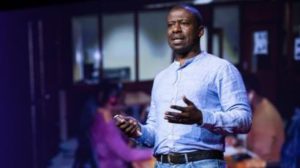- Stay Connected
TEDGlobal: Africa needs more engineers and makers

Africa needs more engineers and makers, the head of Gearbox – Nairobi’s leading maker-space – has told the TEDGlobal conference in Tanzania.
Kamau Gachigi said that by 2050 Africa’s population is projected to have doubled and needs to build economies to sustain that level of growth.
Digital fabrications labs such as Gearbox were vital to this, he said.
Such labs need to start building more Africa-specific hardware, he added.
“These labs help people become more practical and more productive. We need many more people to develop their potential and contribute to society.”
He spoke about how young engineer Simon Wachira had used the lab to create a robotic tool that could cut both metal and wood, which is now creating parts for car giant General Motors.
Another project saw 24-year-old Esther help design sanitary towel dispensers which can be put up in schools to avoid the issue of girls missing school when they have their period.
And a third saw a pharmacy student design 3D models of CT scans that surgeons can use to practise operations before they operate on real tumours.
“He is making money selling these models to surgeons. It saves up to 60% of operation time and that means insurance companies are interested. He now has a business and doesn’t need to go back to university,” said Mr Gachigi.

Kamau GachigiImage copyrightTED
Image caption
Kamau Gachigi said there was a need for more engineers
Africa needs more engineers and makers, the head of Gearbox – Nairobi’s leading maker-space – has told the TEDGlobal conference in Tanzania.
Kamau Gachigi said that by 2050 Africa’s population is projected to have doubled and needs to build economies to sustain that level of growth.
Digital fabrications labs such as Gearbox were vital to this, he said.
Such labs need to start building more Africa-specific hardware, he added.
“These labs help people become more practical and more productive. We need many more people to develop their potential and contribute to society.”
ADVERTISEMENT
He spoke about how young engineer Simon Wachira had used the lab to create a robotic tool that could cut both metal and wood, which is now creating parts for car giant General Motors.
Another project saw 24-year-old Esther help design sanitary towel dispensers which can be put up in schools to avoid the issue of girls missing school when they have their period.
And a third saw a pharmacy student design 3D models of CT scans that surgeons can use to practise operations before they operate on real tumours.
“He is making money selling these models to surgeons. It saves up to 60% of operation time and that means insurance companies are interested. He now has a business and doesn’t need to go back to university,” said Mr Gachigi.
Mobius jeepImage copyrightMOBIUS
Image caption
The next iteration of Mobius’s low-cost jeep is due in 2018
Many speakers at the conference drew attention to the lack of manufacturing in Africa and the need to change that.
Joel Jackson is part of the small Nairobi manufacturing scene, making low-cost Jeeps with local staff and materials.
Mobius is a low-cost stripped-down car designed for Africa’s often rugged terrain. The firm sold 50 of them in 2015 and now, with a few tweaks based on customer feedback, is due to launch a second generation model next year.
At a cost of $11,000, it remains unaffordable for many Africans but the firm is already planning an even cheaper, modular vehicle which will be a basic chassis which people can effectively clip different designs on.
Education was also a key theme at TEDGlobal and MIT professor Clapperton Mavhunga wants to see African schools radically rethink education.
“We need to teach students to think critically and solve problems but at the moment students come to class, lecturers pour information into their ears and then they memorise that to pass exams,” he said.
The trend for university students to leave their villages and often their country to work for foreign firms also needs to be reversed.
Problem-solving is fertile in villages where people have to come up with solutions to their everyday challenges, he said.
“We should turn these villages into labs. These students need to go back to their villages and work for their communities. If ten of these join up there is the beginning of a village institute.”
Another issue raised at the conference was the lack of women in the technology sector in Africa.
In Nigeria, a new initiative – Nigerian Women Techsters – is aiming to change that. Launching in October, it intends to teach 7,200 women in 12 states in Nigeria to code.
